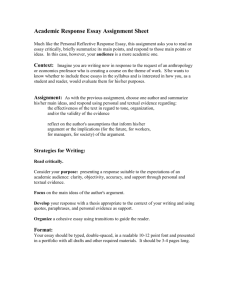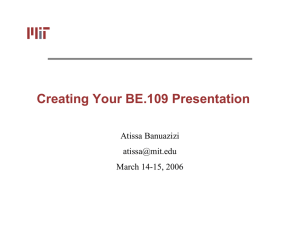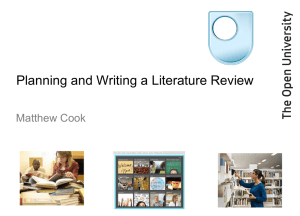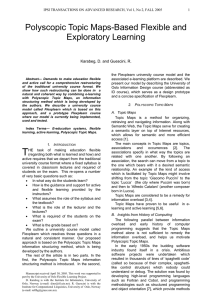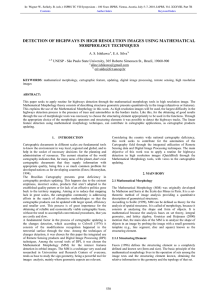Essays/ Assignments
advertisement
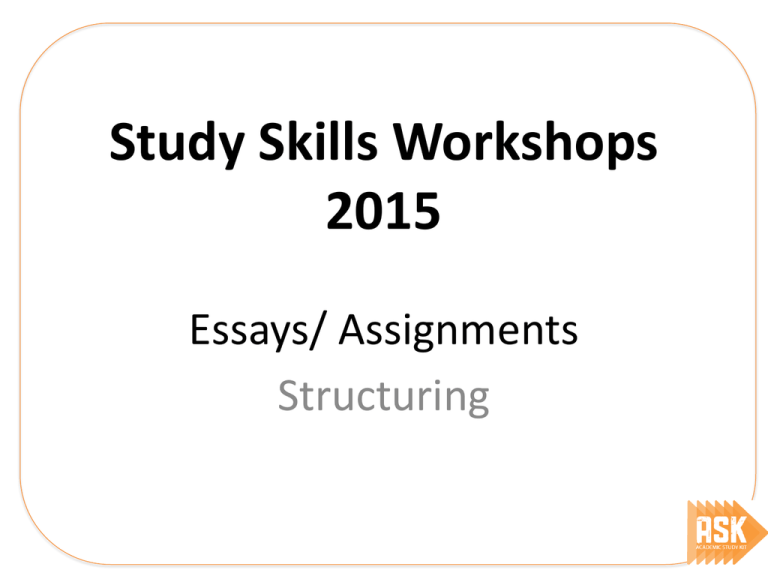
Study Skills Workshops 2015 Essays/ Assignments Structuring Session Aims To discuss: • Planning and structuring essays • The writing process/ developing your writing • Academic writing • Reading, note-taking and referencing Planning and structuring • Answering the ‘question’ (Essay Title) Is the question open-ended or closed? Underline key words Try breaking the question down into sub- questions Top tip: Set the question in context – how does it fit with the key issues, debates and controversies in your module and your subject as a whole? An essay question often asks about a specific angle or aspect of one of these key debates. If you understand the context it makes your understanding of the question clearer. Planning and structuring • Before reading – generate some ideas.. - What do you already know about the topic – from lectures, seminars, general knowledge? - What things don't you know about the topic, but need to find out in order to answer the question? - What are your initial responses or answers to the question – what you think your conclusion might possibly be? • After reading – summarise your findings.. – Use 1 A4 page – Mind map or list points – Bring together key points – use colour or symbols to group ideas/themes together – Begin mapping an essay structure for your main points Planning and structuring Introduction: Address the question, show why it's interesting and how you will answer it. Main Body: Build your argument. Put your groups of ideas in a sequence to make a persuasive argument. One main point in each paragraph. Conclusion: Summarise your arguments and evidence, and show how they answer the original question. Academic writing Avoid shortened forms: • Shouldn't, it's for it is Avoid popular phrases or cliches such as: • at the end of the day; in a nutshell; when it comes to the crunch • Replace with: finally, in summary, in a crisis Avoid: • subjective descriptions ("this beautiful sculpture") • phrases that sound like speech ("well, this bit is really fascinating") • casual everyday words such as really, okay, maybe. Where possible use the third person (“it can be argued” rather than “I think”) Academic writing – including evidence and your own ideas A suggestion on how you can construct a paragraph that includes evidence and your own ideas: • Introduce your point (your own words) • Add the evidence to support your point (quoted or paraphrased evidence that needs to be referenced) • Explain how and why this evidence supports your point and what you think of it (your own interpretation and critical thinking) • Explain how the point helps answer the question (your own argument) Some ways to get more critical analysis into your essays • Avoid unnecessary description • Don’t just summarise what you have read • Interpret your evidence – preferable from more that one source • Be specific • Use counter-arguments to your advantage Referencing Referencing includes: • Citations (direct quotes, paraphrases, reference to other peoples ideas or work) • Bibliography/ reference list – alphabetical list of sources Find out which style your subject area uses. Harvard? Chicago? Use referencing software e.g. Endnote or Zotero Editing and proofreading • Are your points in the right order and relevant to the question? • Be ruthless – irrelevant? Cut it out!! • Are your points clear? Any gaps? • Leave at least a day before re-reading • Read your essay aloud or use text reading software • Check your references are complete and accurate Useful links • Free software and handouts https://www.dnamatters.co.uk/resources/ • For sessions on Endnote and mindmapping software go to:http://about.brighton.ac.uk/is/studentloco/lo co.php



